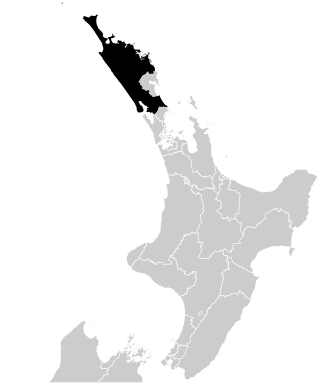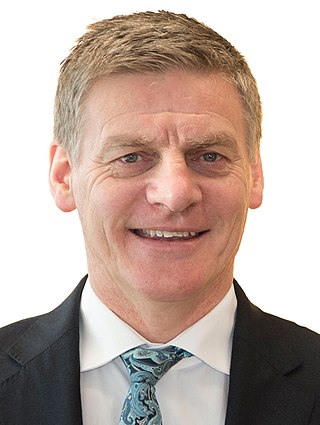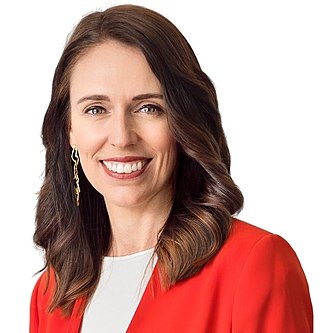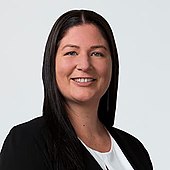New Zealand First, commonly abbreviated to NZ First or NZF, is a political party in New Zealand, founded and led by Winston Peters, who has served three times as deputy prime minister. The party has formed coalition governments with both major political parties in New Zealand: with the New Zealand National Party from 1996 to 1998 and 2023 to present, and with the New Zealand Labour Party from 2005 to 2008 and 2017 to 2020. New Zealand First currently serves in a coalition government with both National and ACT New Zealand as part of the Sixth National government, having won 6.08% of the total party vote in the 2023 New Zealand general election.

Northland is a New Zealand parliamentary electorate, returning one Member of Parliament to the New Zealand House of Representatives. The electorate was established for the 1996 election. It was represented by National Party MP John Carter from 1996 to 2011, and then National's Mike Sabin until his resignation on 30 January 2015. The by-election in March 2015 was won by New Zealand First party leader Winston Peters. Peters was defeated by National's Matt King in the 2017 general election. King in turn was defeated by the Labour Party's Willow-Jean Prime in the 2020 general election, who became the first Labour MP elected for the area since the party won the predecessor electorate Bay of Islands in 1938. Prime was later defeated in the 2023 election by National's Grant McCallum

Te Tai Tokerau is a New Zealand parliamentary Māori electorate that was created out of the Northern Maori electorate ahead of the first Mixed Member Proportional (MMP) election in 1996. It was held first by Tau Henare representing New Zealand First for one term, and then Dover Samuels of the Labour Party for two terms. From 2005 to 2014, it was held by MP Hone Harawira. Initially a member of the Māori Party, Harawira resigned from both the party and then Parliament, causing the 2011 by-election. He was returned under the Mana Party banner in July 2011 and confirmed at the November 2011 general election. In the 2014 election, he was beaten by Labour's Kelvin Davis, ending the representation of the Mana Party in Parliament.
Ian Peters is a former New Zealand politician. He represented the Tongariro electorate with the National Party from 1990 until 1993. In 1993 he defected to the newly formed New Zealand First party with his brother Winston Peters, but was not re-elected in that year's general election.

The 2011 New Zealand general election took place on Saturday 26 November 2011 to determine the membership of the 50th New Zealand Parliament.

The 2014 New Zealand general election took place on Saturday 20 September 2014 to determine the membership of the 51st New Zealand Parliament.
Michael Lewis Sabin is a former police officer, drug educator and New Zealand politician. He is a member of the National Party and was a member of the House of Representatives from 2011 to 2015. He played a key role in establishing the Alcohol and Other Drug Treatment Court in New Zealand.

The 51st New Zealand Parliament was elected at the 2014 general election. This Parliament consists of 121 members and was in place from September 2014 until August 2017, followed by the 2017 New Zealand general election. Following the final vote count John Key was able to continue to lead the Fifth National Government.

The 2017 New Zealand general election took place on Saturday 23 September 2017 to determine the membership of the 52nd New Zealand Parliament. The previous parliament was elected on 20 September 2014 and was officially dissolved on 22 August 2017. Voters elected 120 members to the House of Representatives under New Zealand's mixed-member proportional (MMP) voting system, a proportional representation system in which 71 members were elected from single-member electorates and 49 members were elected from closed party lists. Around 3.57 million people were registered to vote in the election, with 2.63 million (79.8%) turning out. Advance voting proved popular, with 1.24 million votes cast before election day, more than the previous two elections combined.
Various organisations commissioned opinion polls for the 2017 New Zealand general election during the term of the 51st New Zealand Parliament (2014–2017). Roy Morgan Research polled monthly, with MediaWorks New Zealand and Television New Zealand polling less frequently. The last The New Zealand Herald was in December 2015, and Fairfax Media discontinued their poll after the 2014 election. The sample size, margin of error and confidence interval of each poll varied by organisation and date, but were typically 800–1000 participants with a margin of error of just over 3%.
Mahesh Jaichand Bindra is an Indian-born New Zealand politician who represented New Zealand First as a list MP in Parliament between 2014 and 2017. He was the party's ethnic affairs spokesperson.
Ria Iris Daphne Bond is a New Zealand politician and former hairdresser. She was appointed to the House of Representatives as a New Zealand First list MP following Winston Peters winning the March 2015 Northland by-election. She now serves as an Invercargill City Councillor after an unsuccessful bid for the 2022 Invercargill mayoral election but a successful attempt to obtain a seat on the city council.

The 2020 New Zealand general election was held on Saturday 17 October 2020 to determine the composition of the 53rd New Zealand Parliament. Voters elected 120 members to the House of Representatives, 72 from single-member electorates and 48 from closed party lists. Two referendums, one on the personal use of cannabis and one on euthanasia, were also held on the same day. Official results of the election and referendums were released on 6 November.

Willow-Jean Prime is a New Zealand politician who was elected to the New Zealand Parliament at the 2017 general election as a list representative of the New Zealand Labour Party. At the 2020 election, she won the electorate of Northland by 163 votes, the closest election of the 2020 cycle.

Ronald Matthew King is a New Zealand politician who was a Member of Parliament for the National Party from 2017 to 2020. During his time as an opposition MP, King's roles included membership of the Justice, Māori Affairs, and Transport and Infrastructure Select Committees, and National's spokesperson for Regional Development, Rural Communities, and Transport. While in parliament he promoted a bill to create a new offense for "king hits" but it was defeated.

Vision NZ is a nationalist political party in New Zealand led by Hannah Tamaki, the co-leader of the fundamentalist Christian movement Destiny Church. Its policies have included opposition to abortion, homosexuality, immigration, and the construction of new mosques. It has supported creating a Māori-owned bank and Tūhoe ownership of Te Urewera, and has called for government funding for Destiny Church programmes.
The New Zealand TEA Party was a registered political party in New Zealand. The party was led by John Hong. The party contested the 2020 general election, but did not win any seats.
Several polling firms conducted opinion polls during the term of the 53rd New Zealand Parliament (2020–2023) for the 2023 New Zealand general election. The regular polls are the quarterly polls produced by Television New Zealand conducted by Verian and Discovery New Zealand (Newshub) conducted by Reid Research, along with monthly polls by Roy Morgan, and by Curia. The sample size, margin of error and confidence interval of each poll varies by organisation and date.

The 2022 Tauranga by-election for the New Zealand House of Representatives was held on 18 June 2022 in the Tauranga electorate, after the sitting member, former National Party leader Simon Bridges, resigned from parliament. The National Party's Sam Uffindell won the by-election in a landslide result, ahead of the Labour Party's Jan Tinetti.
DemocracyNZ is an unregistered political party in New Zealand. The party was established and is led by former National Party MP Matt King following the anti-vaccination occupation at parliament. The party claims to be centrist and stand for democracy, equality, and unity for New Zealanders. Its public statements have been focused on opposition to New Zealand's pandemic response and to climate change regulations.













